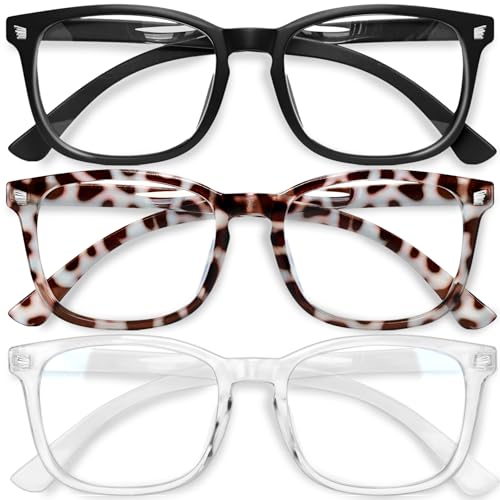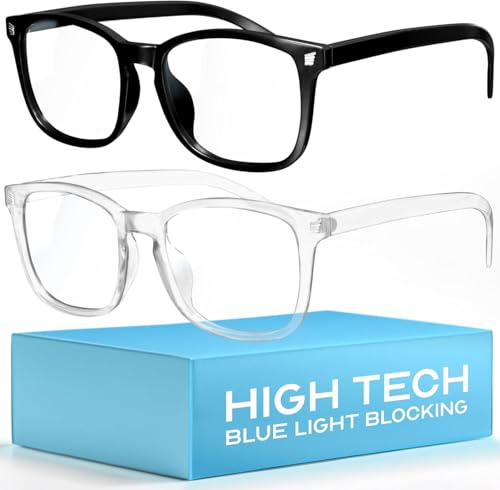I use many tools in my shop. My eyes can get tired from screens and bright lights.
Blue light glasses filter out some blue light from screens, LED work lights, and other artificial sources. Some people say these glasses make their eyes less tired during long projects.
When I first heard about blue light glasses, I thought they were just for computer work. Now, there are versions made for people who spend hours in bright, high-tech workshops.
These glasses can be helpful if you use digital measuring tools or look at screens while planning projects. They also help when working under intense shop lighting.
When I choose a pair, I look for glasses that are comfortable and fit well under hearing protection or face shields. The material matters too, since I don’t want frames that break easily if dropped.
Lens clarity, scratch resistance, and blue light blocking ability are important. Safety comes first, but a good pair should also feel good to wear for hours.
I looked at several options to find blue light glasses for woodworking that keep my eyes comfortable while I work.
Best Blue Light Glasses for Woodworking
I often spend hours in the workshop. Staring at screens can leave my eyes tired.
To help, I’ve found some of the best blue light glasses made for woodworking. Here are my top picks to keep your eyes feeling fresh.
Livho Blue Light Glasses
If you want reliable blue light glasses that are comfortable and easy to use while woodworking or working at a screen, these are a great pick.
Pros
- Feels lightweight and stays comfortable through long shop sessions
- Colors look natural—no weird tint over my view
- Stylish frames that don’t feel out of place
Cons
- Lenses can pop out if you’re rough with them
- Frames may feel a bit flimsy if you drop them
- Cleaning smudges off takes a bit more effort
After trying these Livho blue light glasses in the workshop and at my computer, I could see and feel the difference within a few hours. My eyes didn’t ache or get tired, even after spending an afternoon sanding and sorting parts while glancing at my plans on the computer.
The frames sat lightly on my nose and ears. I rarely noticed them, even under earmuffs or a face shield.
The lenses don’t mess with the colors of my wood or stains. This makes matching finishes much easier compared to other blue light glasses I’ve worn before.
The design also looked good. I didn’t feel silly wearing them around others in the shop.
The frames could be sturdier, so I have to be gentle when putting them on and off. Smudges showed up quickly, but they wiped off fine with a soft cloth.
NoCry Blue Light Safety Glasses
These glasses are reliable for eye protection in the shop, especially if you wear prescription glasses.
Pros
- Easily fits over regular glasses without feeling tight
- Blocks strong blue light and UV rays well
- Adjustable and comfortable for long work sessions
Cons
- Lenses can scratch if you’re not careful
- Not polarized, so not ideal for really bright outdoor use
- Large frame may not fit in small storage spots
When I put on the NoCry Blue Light Safety Glasses, I noticed how they slid over my regular glasses with no hassle. It’s hard to find safety glasses that don’t pinch or press into my head, but these stayed comfortable all day.
Adjusting the arms was simple. They didn’t keep slipping down.
The orange-tinted lenses helped reduce glare. My eyes didn’t feel as strained when I worked under harsh shop lights or looked at screens for plans.
Even after hours of sanding and cutting, my eyes felt less tired. They held up against sawdust and wiped down easily if they collected grime.
I have to watch out for how easily the lenses can scratch. I try to keep them in a soft pouch when I’m not wearing them.
While they’re not polarized and won’t replace strong sunglasses outside, they work well in the shop. For anyone who needs to wear safety glasses over regular prescription frames, these are a solid and comfortable option.
ProtectX Classic Safety Glasses
If you need reliable blue light glasses with solid protection in the workshop, I think these are a strong choice thanks to their comfort and clear view.
Pros
- Lightweight and don’t slip during long woodshop projects
- The added temple guards give extra side protection
- Anti-fog coating works well in both indoor and outdoor use
Cons
- Sides could cover a bit more for extra safety
- Lenses can pick up scratches after heavy use
- Style and fit may not work for everyone
After using the ProtectX Classic glasses while sanding and cutting, I found the clear polycarbonate lens helpful for avoiding eye strain from shop lights and screens. The glasses felt light on my face.
The anti-fog feature made a real difference when moving between my cool garage and warmer indoors. The extra side shields are a real plus for woodworking, catching sawdust on the sides.
I wish they came down further for more complete coverage. While the scratch resistance worked at first, after a week of rough use, a few marks did show up.
The anti-glare and UV protection are both features I could really notice, especially when working by the window. The comfort level stayed high, and I didn’t have to keep adjusting the fit, even with lots of movement.
Bloomoak Blue Light Glasses
If you want lightweight glasses that reduce eye strain and help you sleep better after woodworking or screen time, these are a solid pick.
Pros
- Very lightweight and comfortable for long woodworking sessions
- Really cuts down on eye fatigue after using bright LEDs
- Helps me wind down and fall asleep after shop work
Cons
- Orange-tinted lenses look a bit odd
- Not the best for reading or nighttime driving
- Frames feel a little less sturdy than some pricier brands
After putting on the Bloomoak Blue Light Glasses while working under my shop lights, I noticed my eyes didn’t feel nearly as tired, even after hours of sanding and drilling. The frames are so light that I almost forget I’m wearing them.
The springy arms keep them snug without pinching behind my ears. The bright orange tint in the lens is hard to miss, but it does a great job filtering out the harsh blue and green light from both overhead LEDs and tool displays.
It also helps me see the true color of wood better by cutting out glare. I started using them in the evening, too, and falling asleep became a lot easier.
One thing to keep in mind is the bold color of the lenses. I wouldn’t wear these to read or while driving at night, as the tint makes details harder to see in low light.
While the frames are flexible, they don’t feel as tough as more expensive pairs I’ve used before. For heavy workshop use, I’d handle them a bit gently.
MCR Safety Blue Light Glasses
If you need reliable and comfortable blue light glasses for woodworking, I think these do the job well for a good price.
Pros
- Lightweight, so barely notice them during long projects
- Wraparound style keeps out dust and small chips
- UV protection is helpful when working outside
Cons
- Lenses can scratch if I’m not careful
- Not the most stylish compared to other options
- Anti-fog effect didn’t last very long for me
When I put on the MCR Safety Blue Light Glasses for woodworking, I noticed how light they felt. They sit easily on my nose and stay in place, which is important when I’m handling different tools or moving around my workspace.
The non-slip nose and temple pieces work well. I didn’t have to keep adjusting them.
With their wraparound lenses, my eyes felt shielded from sawdust and flying chips that come with woodworking. I also spent an afternoon working outside, and the UV protection was a clear bonus.
It kept my eyes from feeling tired or strained, especially in bright daylight. Even though the glasses had an anti-fog coating, it faded after a few weeks of use.
The lenses are prone to scratches, so I had to be more cautious when cleaning or storing them. They might not win any style points, but for safety and comfort while woodworking, I found them dependable.
Buying Guide
When I shop for blue light glasses for woodworking, I look for several key features. The right pair protects my eyes and helps me work longer with screens or under bright lights.
Frame Comfort:
I prefer glasses that feel light and comfortable on my face. Adjustable nose pads or flexible arms keep the glasses secure while I move around the workshop.
Lens Features:
Choose lenses that block blue light but don’t distort color. Clear lenses help me see wood tones and details better than yellow-tinted lenses.
I also like lenses with an anti-scratch coating.
Key Features Checklist:
- Lightweight frame
- Adjustable nose pads
- Scratch-resistant lenses
- Non-yellow tint for clear vision
- Wide lens area for extra protection
| Feature | Why It Matters |
|---|---|
| Lightweight | Less pressure on nose/ears |
| Wide lenses | More eye coverage |
| Clear lenses | True color, less distortion |
| Scratch resistance | Durability in workshop |
Fit and Size:
It’s important that my glasses fit well. I check the frame width and arm length to make sure they match my head size.
Glasses that are too loose can slip during woodworking. If I already wear prescription lenses, I look for blue light glasses that fit over my regular glasses or can be made with my prescription.

















